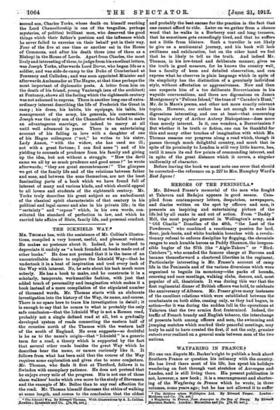HEROES OF THE PENINSULA.* Mr. Edward Fraser's memorial of the
men who fought at Talavera and Badajoz appears in good season. Coin- piled from contemporary letters, despatches, newspapers, and diaries written on the spot by officers and men, it presents an inspiring and entertaining picture of the life led by all ranks in and out of action. From " Daddy " Hill, the most popular general in Wellington's army, and
Old Charlie " Donellan of the 48th, " the Last of the Powderers," who combined a reactionary passion for lard, flour, jack-boots, and white buckskin breeches with a revolu- tionary refusal to enforce discipline by flogging, the chronicle ranges to such humble heroes as Paddy Shannon, the irrepres- sible bugler of the 87th (the " Aigle-Takers " or " Bird- Catchers "), who sounded the famous charge at Barrosa and became thenceforward a chartered libertine in the regiment. Particularly interesting is Mr. Fraser's account of camp life in the Peninsula and of the various diversions which were organized to beguile its monotony—the packs of hounds, coursing and race meetings, walking clubs, dances, and, most popular of all, theatricals. It was during this war that the first regimental dinner of British officers was held, to celebrate the anniversary of Allonera. Mr. Fraser gives many instances of the excellent relations which were established between the combatants on both sides, ceasing only, as they had begun, in action—for it was during the sudden lull in the operations at Talavera that the two armies first fraternized. Indeed, the traffic of French brandy and English tobacco, the interchange of presents both among officers and men, the swimming and jumping matches which marked their peaceful meetings, may truly be said to have created the first, if not the only, genuine entente ever realized on a general scale between men of the two, nations.










































 Previous page
Previous page